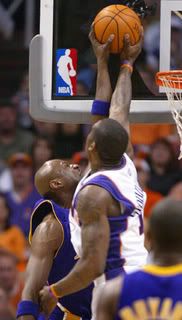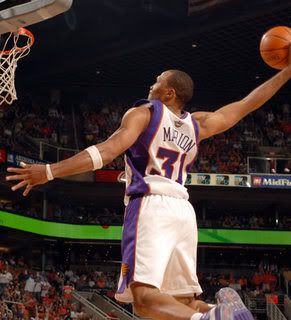It had to happen. No matter how hard we try to progress as a society, some wise-acre has to degrade every argument into a question of race. Two years ago, Dan LeBatard of the Miami Herald questioned whether race played a role in Steve Nash's first MVP award. (I have looked, but the original article is nowhere to be found.)
The accusation was categorically dismissed by the voters and the majority of the mainstream media, as well as most NBA fans. Why? Because to the majority, Steve Nash absolutely deserved his award.
Not willing to let the issue die and focus on more relevant examples of racism in sports, a person working under the guise of "mainstream media watchdog" decided to dig up a dead horse. Jack McCallum responded, and away we went.
I won't bore anyone with the ugly details, nor will I rehash the argument I already made in the comments of the last link. I am not impressed with the arguments coming from either side, and I don't even think it should even have been brought up. That's the problem with bringing up racism - one side says that racism is inherent in our society, and the other side denies any racist (or racially reasoned) intent. Neither side will budge, and no minds are going to change . . . not when the haystack is not hiding a needle.
There is one central question posed in this whole argument. "Is it possible that race was a factor that the voters considered?"
That is a loaded question because there is only one answer. Yes - it is possible.
Mathematically speaking, any theory is possible until it is disproved. The only way for an event to be impossible is for its probability of occurrence to be measured at ZERO. So now that we have determined that it is, indeed, possible that race played a role in the 2005 MVP voting, all the nutcases get to come out of the woodwork screaming, "AH HA! I KNEW IT!"
Hold the phone there, Sparky. "Possible" does not imply "probable." It is possible that a meteor will strike the earth and destroy 75% of the species on the planet before I publish this post. It is possible that a bolt of lightning will strike your house, burst through your computer screen, and effectively lobotomize you while you read this.
The question then becomes, "How likely is it that race played a factor in the MVP voting?" That ain't spinach, Popeye. Those are worms.
Cosellout questions the integrity of the mainstream media for not attacking this issue more vehemently, further claiming that the media is responsible for sweeping potential racism under the rug. He wonders why they dismissed it so quickly.
I'll tell you why.
It is irresponsible journalism to take such an inflammatory topic and apply it to a debate regarding a meaningless award. Voters make their choices based on reasons known only to them, unless they tell us themselves. And if you ask them if race played a role in their decision, they will tell you that it did not. Case closed. No conjecture. No accusations. It is better to take a person at his word in an instance like this than to force them to defend themselves for something they did not do, however "subconsciously."
What do these people expect to do? Psychoanalyze through speculation and response? Force the voters to question their own decisions that they based on statistics, player performance, and team record with and without the player in question?
There were many valid reasons to vote for Steve Nash as MVP, not least of which is the incredible turn around the Suns experienced when he jumped on board - 33 games, good for fourth best in league history.
It is a fun debate, not an important one. To lay such an important and divisive issue on top of it is to spoil the fun of being a fan of the NBA. There are many cases of REAL racism and racial issues to discuss in sports.
The reason that this issue has no place on this topic is that there is no evidence to support the notion that race was involved in the vote. There is, however, plenty of evidence to support the reasons given by voters.
The human subconscious is not an appropriate place to look because it is not only completely out of our control, it is unprovable. That makes the argument moot. There is no reason to call into question the integrity of these people based on circumstantial evidence (white voters, white player). For that very reason, every court in the country would throw out the case if it were brought to them.
That the mainstream media glossed over this issue is not an indication that people are afraid to talk about race. On the contrary, it is an indication that they are responsible enough not to light a cigarette in a dry forest. Dan LeBatard was deservedly lambasted for even suggesting such a thing. He covers Shaquille O'Neal for a living . . . that should say something about the credibility of his argument. It is based less on reality and more on unsweetened vine fruit.
Your question has been answered, Cosellout. Now drop it before it gets ugly. We have enough to worry about in this world, and whether or not Steve Nash's whiteness won him an award is in the bottom one percent of the list. It didn't. Get over it.
You'd do more good questioning the media's refusal to point out political inconsistencies regarding the war in Iraq. Focus on their refusal to ask the really tough questions. Anything but an unprovable set of circumstances surrounding such a trivial aspect of life that the doesn't even concern the majority of the population.
You want to discuss race? Ask Al Sharpton why he has targeted Isiah Thomas, and not the entire mainstream music industry.
Nigga, please . . .
Update: I made an error in judgement. I hadn't read McCallum's full response, taking for granted that I was reading someone who takes his writing seriously. For this, I apologize to Mr. McCallum.
It seems that in Cosellout's zeal to defend himself, he committed an unpardonable sin in my book. Every quote he used from McCallum's piece was taken completely out of context. Cosellout attacked the weakest points of McCallum's argument, and he ignored the full scope of it. This is known as a strawman argument, and it is a fallacy.
It is shameful. Here we have a purported media watchdog violating basic journalistic ethics in order to discredit "real" journalists, wondering why no one is talking about this particular issue.
Here's a clue, jackass: It's called journalistic integrity.
If your goal is to change the way people think about the media, then you might want to consider exemplifying the standards to which you wish them to be held.
October 20, 2007
Subscribe to:
Comments (Atom)


